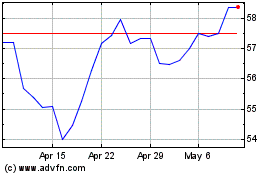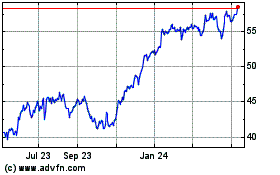By Katy Burne
A dispute over technology could pose a new threat to Wall
Street's plumbing by severing a link that allows big banks to
borrow freely from one another, according to market
participants.
A unit of Depository Trust & Clearing Corp., the dominant
processor of repurchase agreements, or repos, between securities
dealers, has told traders it will stop facilitating certain
interbank repos as of July 15. The roadblock affects an estimated
$45 billion in daily repo loans, short-term loans through which
banks and other financial firms exchange cash and securities to
raise funds for their trading activities.
A clearing bank confirms the identity of parties to a trade and
their terms, before processing the transaction. In settlement, a
third party ensures the quantities agreed upon in the trade are
transferred.
The suspension would mean the DTCC unit couldn't match up trades
between dealers that have cleared their interbank repos through
Bank of New York Mellon Corp., a large clearing bank, and dealers
that clear through BNY's distant competitor in repo clearing, J.P.
Morgan Chase & Co. Since a unit of DTCC will no longer bridge
the divide, dealers will only be able to trade with firms that
process their trades through the same clearing bank.
A handful of dealers have already scheduled some monthslong
repos to expire before the cutoff, in a bid to insulate themselves
from changing conditions as the break ripples through that corner
of the roughly $3 trillion U.S. repo market, according to people
with knowledge of the contracts.
The shift "will further bifurcate" the repo market at a time
when it is already under pressure from regulation, said Josh
Galper, managing principal at consultancy Finadium. The change,
which would have to be signed off by the Securities and Exchange
Commission, also would likely lead to the adoption of different
repo rates for Bank of New York Mellon and J.P. Morgan clients,
said Joseph Abate, an analyst at Barclays PLC.
The trades that would be affected by the suspension are repos
between dealers that cross clearing banks and are backed by
Treasurys, mortgage bonds and agency debt in trades known as
"general collateral finance." Those GCF trades account for about
$45 billion, or 15% of the $300 billion in daily interdealer repo
trading.
The decision is the latest twist in a long-running struggle by
bankers and the Federal Reserve to reduce risk in repos. Regulators
accelerated those changes after the 2008 financial crisis exposed
structural flaws. Under the overhaul, BNY and J.P. Morgan
rejiggered settlement times and virtually eliminated the amount of
intraday credit they have extended to dealers in some repos, moves
lauded by the Fed.
Last year, the Federal Reserve Bank of New York said the
industry had met several repo-overhaul milestones but that
settlements of interdealer GCF repos across clearing banks remained
out of sync with other repos. It called the misalignment a
"potential source of market instability in periods of stress."
In an effort to align interdealer GCF trades and other repos,
BNY, J.P. Morgan and DTCC set out to build new technology for
swapping information about the cash and securities being exchanged
between clients of the clearing banks.
J.P. Morgan completed a series of enhancements and the DTCC unit
completed the majority of its own, but BNY determined that the
technology work would have taken too much time and resources,
people familiar with the situation said. At the same time, BNY
asked a unit of DTCC to accept new limits on a credit facility the
bank provides to the settlement firm.
When they couldn't resolve their differences, the DTCC unit,
called Fixed Income Clearing Corp., chose to suspend its interbank
GCF repo services.
Repo volumes already have been shrinking in response to new
rules targeting banks. The planned suspension has traders and the
Fed on watch for further disruptions, participants said. The New
York Fed, which has overseen the repo reform efforts, hasn't
intervened in the standoff, said people familiar with the
matter.
"In a world where everyone is concerned about lack of liquidity,
why take this away?" one large dealer complained of the planned
suspension.
The activity across clearing banks was suspended by DTCC once
before, between 2003 and 2008, but at that time the business was
divided more evenly between clearing banks. Now, BNY Mellon has a
roughly 85% share of the dealer client base in such repos.
Changing clearing banks is operationally taxing and few are
expected to do so.
Some traders said the suspension could leave J.P. Morgan and its
clients--which people familiar with the matter said include units
of Credit Suisse Group AG, Royal Bank of Scotland Group PLC and
HSBC Holdings PLC--disadvantaged, with fewer trading partners in a
panic, and could potentially complicate any attempts to resolve
firm failures. Representatives of those firms declined to
comment.
Others said that dealers on the J.P. Morgan side tend to have
more cash than securities, but they may have to pay more to
transact than BNY Mellon clients under the change. J.P. Morgan
already has an account at BNY and could expand its own
capabilities, said one person involved in the talks between the
banks.
One industry idea under discussion is a new repo clearinghouse
that could solve the issues across the clearing banks, but the
mechanisms are complex and unlikely to be ready by July 15.
(END) Dow Jones Newswires
January 31, 2016 19:18 ET (00:18 GMT)
Copyright (c) 2016 Dow Jones & Company, Inc.
Bank of New York Mellon (NYSE:BK)
Historical Stock Chart
From Mar 2024 to Apr 2024

Bank of New York Mellon (NYSE:BK)
Historical Stock Chart
From Apr 2023 to Apr 2024
